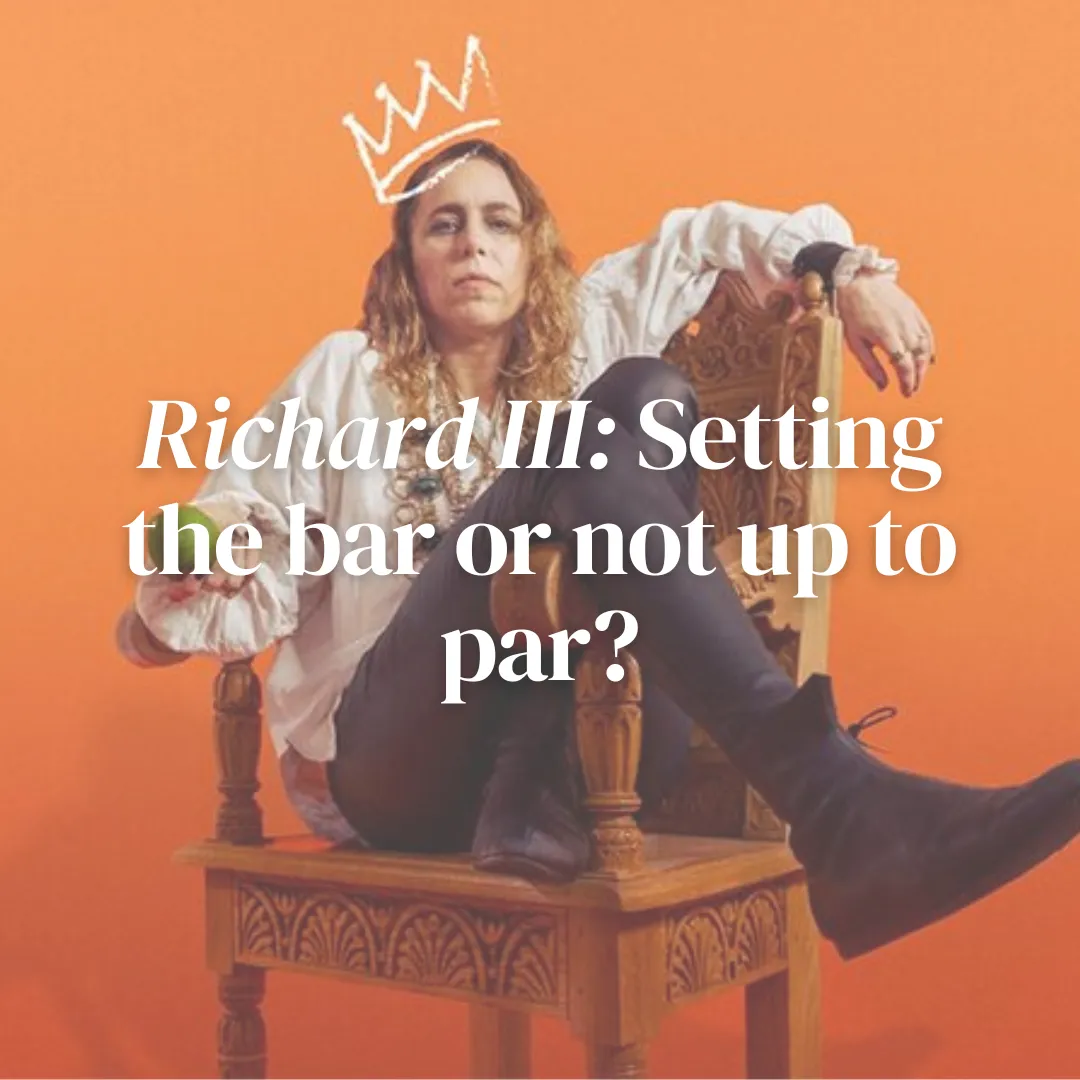


Richard III
“Because theatre is always already an adaptation of sorts, the question of casting can easily get misaligned between intention and reception within a discussion of stage adaptation.” - Jane Barnette, Adapturgy: The Dramaturg’s Art and Theatrical Adaptation
On May 11th, my parents, friends, and I excitedly took our seats at the Globe Theatre to attend the opening night of Richard III. My personal favorite, I believe that Richard III is one of Shakespeare’s finest works because it exemplifies a perplexing titular character. Richard is both evil and sympathetic, as he gains the audience’s trust and support in committing heinous crimes. When reading Richard III, I found myself constantly pulled back and forth between supporting Richard and those who oppose him. What he’s doing is wrong, no doubt, but breaking the fourth wall as a theatrical device makes me inclined to support him and curious to see if he can really pull it off. Importantly, Richard wins our trust and support not through the actual murders and schemes, but by explaining the lifelong oppression and prejudice he has faced because of his disability, making him “determined to prove a villain.”
Richard III is arguably the most renowned character with a disability throughout the English theatrical canon, and I believe that the Globe should have cast an actor with a disability in the role. Richard’s disability plays an essential role in the play, as the prejudices others harbor against him motivate his goals and the plot of the play itself. This is an essential component of Richard III both character wise and plot wise, and I believe that the Globe’s erasure of Richard’s disability was detrimental to the production.
Michelle Terry, the director and actor playing Richard, is a fantastic actor. She is widely known for acting in Shakespearian productions, and she also played the titular role in Hamlet. I was still moved by her performance, and I could understand the thoughtfulness and intention behind each monologue. However, the other issue that I found with the production is that Terry’s Richard III was a mirror image of Donald Trump. Sporting a short, platinum blonde wig and walking with an air of confidence, Terry’s production was unmistakably inspired by the American president and the controversy surrounding him. While I believe theatre is inherently political and democratic, it felt as if the Globe were fitting a square peg into a round hole, and disrespecting Richard III’s character by doing so.
Firstly, Richard is determined to prove a villain because of the disadvantages he has faced as a result of his disability. While both Richard III and Donald Trump come from wealth, Trump has never faced the prejudice that is a crucial part of Richard’s character and the play. By aligning the two, Richard is demeaned into an immature, power-hungry individual whose claim to the throne is derived from nothing other than greed. I believe that this is a misunderstanding of Richard’s character and of the play itself, and that the production suffered because of it.
I genuinely applaud other aspects of the production. The play’s fully femme casting worked beautifully, and I was excited to see a female Richard III. Additionally, the acting was fantastic all across the board. I enjoyed the costuming, which was modern but reminiscent of the Elizabethan age (save the red hats, which the characters wear when Richard ascends to the throne). I enjoyed the atmosphere, and it was a beautiful evening to see a production in an open theatre like the Globe. I enjoyed the text, and I am awestruck by Shakespeare’s genius time and time again despite having studied him and seen many of his works performed. Most of all, I enjoyed the company. Seeing the play with my parents and two of my best friends was a treat, and it certainly sparked a lively discussion afterwards which I always look forward to.
Opening night of Richard III was not well attended. I can see why, given the controversy which has surrounded the production’s take on Shakespeare’s classic work. To summarize, I believe that the two main issues were surrounding the portrayal of Richard. Removing Richard’s disability from the play and basing him off Donald Trump instead removed one of the most essential, fundamental aspects of the play and came across as being disrespectful. Also, politics aside, it is natural and often commendable to use theatre as a political tool to point out hypocrisy, flaws, or other negative aspects of a world leader or government. Theatre has historically been used as a form of protest, and I hope that theatre continues to have a social and political impact. However, as I opened my phone at intermission and saw the American Airlines boarding pass which would take me back home to Pennsylvania the following morning, I couldn’t help but feel something. Watching British actors portray what is meant to be a complex, driven, intellectually stimulating character as the American president just didn’t feel right. I would love to see another woman play Richard III, but I believe Terry’s character lost the motivation to truly jumpstart the action in the play. The two storylines, that of Richard and that of the current American political atmosphere, do not align well and intermingling this with the erasure of Richard’s disability significantly altered the production and was a disservice to Shakespeare and his works.
Email: christina@christinalschwab.com
Site: www.christinalschwab.com
